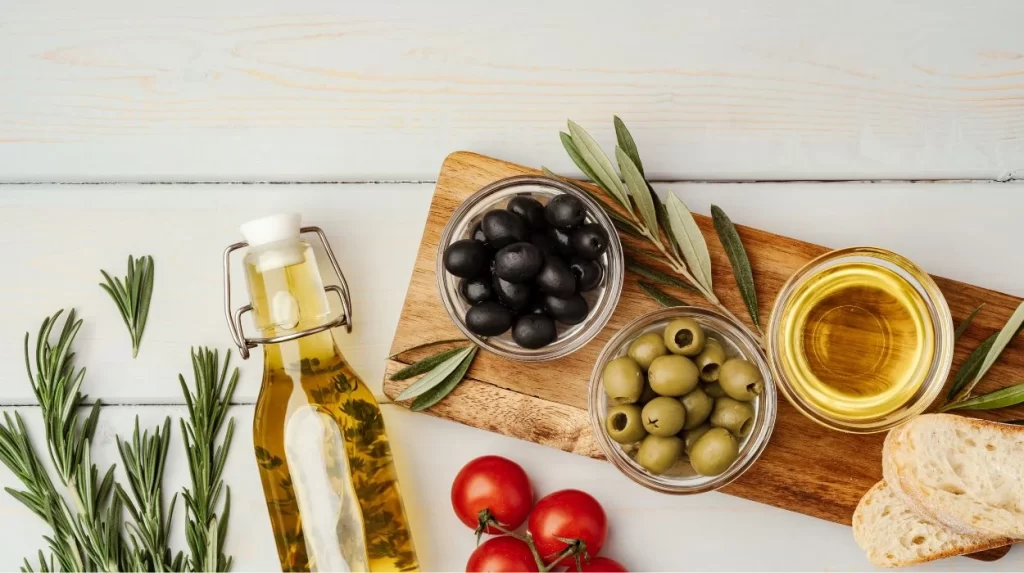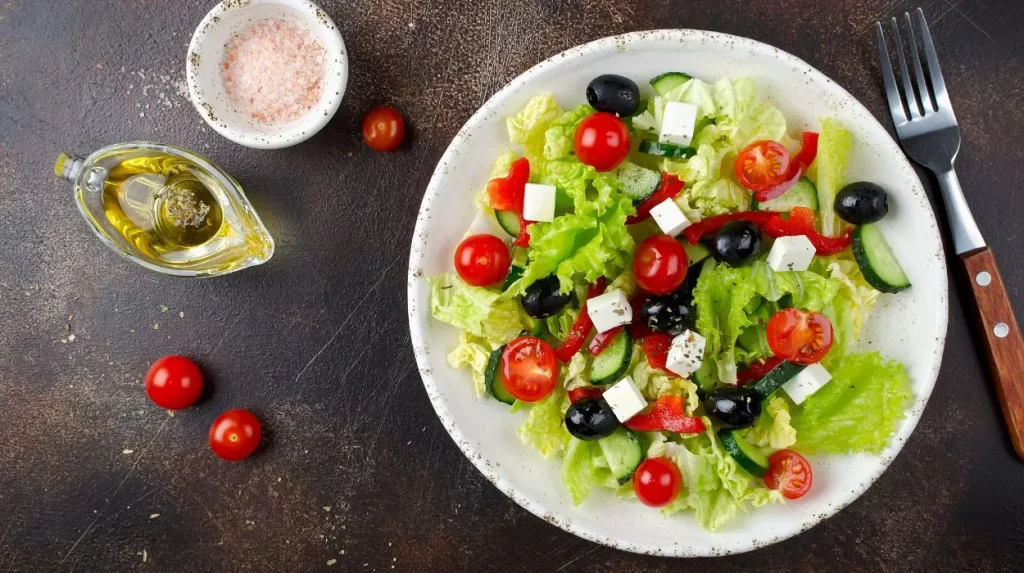Many people may not realize that olives are a Mediterranean fruit. Olives are often enjoyed as a salty snack and are a source of healthy unsaturated fats. People have enjoyed them since at least 410 B.C.,[1] and they continue to be popular today. But is eating too many olives bad for you? Is there such a thing? Keep reading to learn more about the nutritional value and benefits of olives.
Is Eating Too Many Olives Bad For You?
The answer is yes.
Like everything, olives should be consumed in moderation. While olives do have some excellent nutritional qualities and can certainly be part of a healthy diet, a balanced diet that includes a variety of foods is key.
What Are Olives?
Olives, also known as Olea europaea,[2]are subtropical fruits originating in the Mediterranean. They grow on olive trees and are the most cultivated fruit trees in the world.
They grow on olive trees, which are only ten meters tall. It takes three to four years for the trees to start bearing olives, but they won’t be in full production until 12 to 20 years of growth.
Olives can be eaten on their own as whole fruits. However, they are required to undergo processing to be edible. Common processing methods are alkaline hydrolysis or slow acid and enzymatic hydrolysis.
This is because fresh, raw olives are extremely bitter, and they cannot be eaten raw and unprocessed.
Processed olives can be eaten when they are green or black. Green olives are unripe, and black olives are ripe.
Many olives are also produced for olive oil production. Extra virgin olive oil is a popular oil and a staple in many households.
Olive Nutrition Facts
As mentioned, processed olives can be eaten black or green, and both will be easily found at your local grocery store. The nutrition facts for both varieties are listed below.
Nutrition information[3] for 50 grams of black olives, approximately ten olives:
- Energy (calorie): 58 kilocalories
- Water: 40 grams
- Protein: 0.42 grams
- Fat: 5.45 grams
- Saturated fat: 1.14 grams
- Monounsaturated fats: 3.83 grams
- Polyunsaturated fats: 0.31 grams
- Carbohydrates: 3 grams
- Fiber: 0.8 grams
- Sugar: 0 grams
- Iron: 3.14 milligrams
- Phosphorous: 1.5 milligrams
- Sodium: 367.5 milligrams
- Vitamin A: 8.5 micrograms
- Vitamin E: 0.825 milligrams
Nutrition information[4] for 50 grams of green olives, approximately 12 olives:
- Energy (calorie): 72.5 kilocalories
- Water: 37.7 grams
- Protein: 0.52 grams
- Fat: 7.65 grams
- Saturated fat: 1.02 grams
- Monounsaturated fats: 5.65 grams
- Polyunsaturated fats: 0.66 grams
- Carbohydrates: 1.92 grams
- Fiber: 1.65 grams
- Sugar: 0.27 grams
- Iron: 0.24 milligrams
- Phosphorous: 2 milligrams
- Sodium: 780 milligrams
- Vitamin A: 10 micrograms
- Vitamin E: 1.91 milligrams
Black olive nutrition and green olive nutrition do vary slightly. The main differences are that green olives are higher in fat, including healthy monounsaturated fats, sodium, dietary fiber, and calories.
While it is positive that olives contain healthy fats, you should be mindful of the sodium content. According to the Dietary Guidelines for Americans, individuals should limit sodium intake[5] to 2300 mg per day, which is equivalent to one teaspoon of salt.
One portion of black olives provides 16 percent of the daily value of sodium. One portion of green olives provides 34 percent of the daily value of sodium.
Any food that provides 20 percent or more of the daily value for sodium is considered high in salt. This means green olives are considered high in salt, and black olives are moderate in salt.
Benefits Of Olives

Although olives contain quite a bit of sodium, there are many health benefits linked to olives and olive oil. Keep reading to learn what research says about olives, olive oil, and their health benefits.
Heart Health
A 2020 study[6] determined that those consuming ½ tablespoon of olive oil per day had a 14 percent lower risk of cardiovascular disease and an 18 percent lower risk of coronary heart disease.
The study also found a decreased risk of heart disease when individuals replaced 5 grams of butter, margarine, mayonnaise, or dairy fat with olive oil. This is all evidence that olive oil benefits heart health.
Chronic Inflammation
A 2018 review article[7] reported that extra virgin olive oil might lessen chronic inflammation. This is thought to be due to its polyphenol content, which are beneficial plant chemicals found in olive oil.
This potential benefit was seen in both animal and human studies.
This means olive oil could be a potential anti-cancer, anti-hypertension, and anti-high cholesterol agent. The authors stated more research is needed in this area before olive oil can be proposed as a potential agent to treat chronic inflammatory states.
Bone Health
A 2016 review study[8] determined, based on evidence from cell, animal, and human studies that olives, olive oil, and olive polyphenols are potential dietary interventions that could aid in preventing osteoporosis among elderly individuals.
This is because olives and olive products can increase bone growth by suppressing oxidative stress and inflammation.
While promising, future research with more human clinical trials is required to determine the true impact of olives on bone health.
Inflammatory Bowel Disease
A recent 2022 study review[9] determined olive oil may supplement standard inflammatory bowel disease medications in disease management. This is due to the anti-inflammatory effect of the polyphenols contained in olive oil, such as oleuropein and hydroxytyrosol.
While these findings are exciting, future research, including randomized control trials, is required to determine olive oils’ effectiveness in managing inflammatory bowel disease.
Diabetes Management
A 2017 meta-analysis study[10] found olive oil intake was associated with a decreased risk of developing type II diabetes mellitus and improved diabetes management. The researchers concluded olive oil is a suitable component of a healthy diet.
Cognitive Function
A 2020 animal study[11] tested the effects of oleocanthal and ligstroside polyphenols from olives on female mice. The study found that one of the polyphenol compounds, ligstroside, had a protective effect on early Alzheimer’s disease development, brain aging, and enhanced cognitive function.
As this study was animal-based, future research involving human trials is required.
How Do Olives Affect Your Weight?
While eating olives is not a magical cure that will help you lose weight, olive oil does contain nutritional qualities that have been associated with weight loss.
High consumption of olive oil is one of the main components of the Mediterranean diet.[12]
The other main components of the Mediterranean diet include a high consumption of vegetables, fruits, nuts, cereals, and whole grains, a moderate consumption of poultry and fish, and a low consumption of sweets, red meat, and dairy products.
Ultimately the Mediterranean diet is a dietary pattern that is high in monounsaturated fats and fiber and low in saturated and trans fats.
Recent findings from a 2022 review study reported weight loss could be achieved through the Mediterranean diet,[12] which in turn can reverse the negative health effects caused by obesity.
This indicates that olive oil could be a dietary staple in a healthy diet that contributes to weight loss and health benefits in general.
You don’t necessarily have to follow the Mediterranean diet to lose weight. Overall, consuming a diet rich in various foods is essential to achieving and maintaining a healthy weight.
What Happens If You Eat Too Many Olives?
We already know the answer to the question “Is eating too many olives bad for you?”, so what will happen if you eat too many olives?
It’s best to avoid consuming foods high in sodium often, as they can increase the risk of high blood pressure. High blood pressure is concerning as if left untreated, it can result in artery damage and lead to further bodily harm such as stroke, vision loss, heart failure, heart attack, kidney disease, and sexual dysfunction.
While olives can be part of a healthy diet, they should be consumed in moderation and alongside other healthy whole foods.
Can you eat too many olives? If you do eat a lot of olives often, you could be consuming too much sodium. Try to consume olives in moderate amounts and eat foods that are not high in sodium.
Pairing high-sodium foods with low-sodium foods will make you less likely to exceed 2300 mg of sodium in one day.
If you have concerns or questions about how to manage your sodium intake, contact a Registered Dietitian.
How To Eat Olives In A Healthy Way

Olives can be added to many meals or even just eaten as part of a healthy snack. Some examples are listed below.
Lunch/Supper
- Make homemade whole wheat crust pizza and use sliced olives as a topping.
- Make a Greek salad with olives.
- Make a Middle Eastern bean salad with olives.
- Try adding olives to a pasta dish.
- Add olives to a homemade sub or sandwich to add a tangy flavor.
- Try making skillet chicken with olive slices.
- Add olives onto a tray baked full of oven-roasted vegetables.
Snacks
- Eat ten whole olives as a quick snack.
- Add olives onto a charcuterie board and serve to guests.
If you are not a fan of olives but want to include olive products in your diet, try cooking with olive oil. It can be used in many cooking or baking recipes and can be found easily in any grocery store.
Summary
Overall, there are certainly health benefits associated with eating olives and consuming olive oil. Caution should be exercised if you are concerned about your sodium intake, as olives do contain quite a bit of sodium.
As long as you are eating olives in moderation alongside a variety of whole foods, they can certainly be part of a healthy diet.
+ 12 sources
- Massaro, M., Scoditti, E., Carluccio, M.A., Calabriso, N., Santarpino, G., Verri, T. and De Caterina, R. (2020). Effects of Olive Oil on Blood Pressure: Epidemiological, Clinical, and Mechanistic Evidence. Nutrients, [online] 12(6), p.1548. doi:https://doi.org/10.3390/nu12061548.
- Gandul-Rojas, B. and Gallardo-Guerrero, L. (2020). Characterization and Processing of Table Olives: A Special Issue. Foods, [online] 9(10), p.1469. doi:https://doi.org/10.3390/foods9101469.
- Usda.gov. (2023). FoodData Central. [online] Available at: https://fdc.nal.usda.gov/fdc-app.html#/food-details/2345617/nutrients.
- Usda.gov. (2023). FoodData Central. [online] Available at: https://fdc.nal.usda.gov/fdc-app.html#/food-details/2345616/nutrients.
- Center (2022). Sodium in Your Diet. [online] U.S. Food and Drug Administration. Available at: https://www.fda.gov/food/nutrition-education-resources-materials/sodium-your-diet.
- Guasch-Ferré, M., Liu, G., Li, Y., Sampson, L., Manson, J.E., Salas-Salvadó, J., Martínez-González, M.A., Stampfer, M.J., Willett, W.C., Sun, Q. and Hu, F.B. (2020). Olive Oil Consumption and Cardiovascular Risk in U.S. Adults. Journal of the American College of Cardiology, [online] 75(15), pp.1729–1739. doi:https://doi.org/10.1016/j.jacc.2020.02.036.
- Casas, R., Estruch, R. and Sacanella, E. (2017). The Protective Effects of Extra Virgin Olive Oil on Immune-mediated Inflammatory Responses. Endocrine, Metabolic & Immune Disorders – Drug Targets, [online] 18(1), pp.23–35. doi:https://doi.org/10.2174/1871530317666171114115632.
- Chin, K.-Y. and Ima-Nirwana, S. (2016). Olives and Bone: A Green Osteoporosis Prevention Option. International Journal of Environmental Research and Public Health, [online] 13(8), p.755. doi:https://doi.org/10.3390/ijerph13080755.
- Vrdoljak, J., Kumric, M., Vilovic, M., Martinovic, D., Tomic, I.J., Krnic, M., Ticinovic Kurir, T. and Bozic, J. (2022). Effects of Olive Oil and Its Components on Intestinal Inflammation and Inflammatory Bowel Disease. Nutrients, [online] 14(4), p.757. doi:https://doi.org/10.3390/nu14040757.
- Schwingshackl, L., Lampousi, A-M., Portillo, M.P., Romaguera, D., Hoffmann, G. and Boeing, H. (2017). Olive oil in the prevention and management of type 2 diabetes mellitus: a systematic review and meta-analysis of cohort studies and intervention trials. Nutrition & Diabetes, [online] 7(4), pp.e262–e262. doi:https://doi.org/10.1038/nutd.2017.12.
- Grewal, R., Reutzel, M., Dilberger, B., Hein, H., Zotzel, J., Marx, S., Tretzel, J., Sarafeddinov, A., Fuchs, C. and Eckert, G.P. (2020). Purified oleocanthal and ligstroside protect against mitochondrial dysfunction in models of early Alzheimer’s disease and brain ageing. Experimental Neurology, [online] 328, p.113248. doi:https://doi.org/10.1016/j.expneurol.2020.113248.
- Muscogiuri, G., Verde, L., Sulu, C., Katsiki, N., Hassapidou, M., Frias-Toral, E., Cucalón, G., Pazderska, A., Yumuk, V.D., Colao, A. and Barrea, L. (2022). Mediterranean Diet and Obesity-related Disorders: What is the Evidence? Current Obesity Reports, [online] 11(4), pp.287–304. doi:https://doi.org/10.1007/s13679-022-00481-1.
